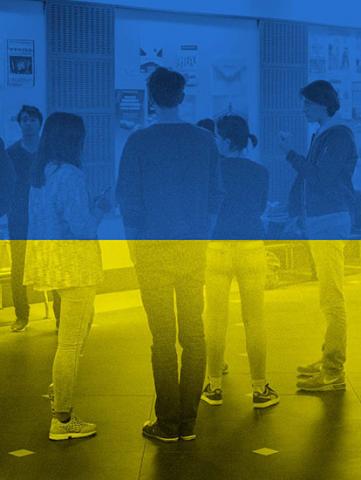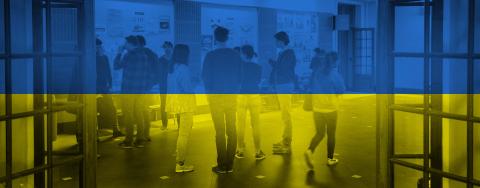

Ukraine Emergency: Our Commitment to Solidarity
In solidarity with those affected by the war in Ukraine, Sorbonne University is taking action through a series of emergency and long-term measures. Guillaume Fiquet, Vice President for International Relations, Regional and Socio-Economic Partnerships, reviews the actions taken by the university since the conflict began.
What emergency responses did Sorbonne University provide in the context of the war in Ukraine?
Guillaume Fiquet : Following the attempted invasion of Ukraine by Russia and the armed conflict that Ukraine has been facing since February 24, 2022, the President of Sorbonne University quickly expressed the commitment of our institution and its solidarity with the Ukrainian people. This included its research community, as well as the Russian and Belarusian nationals who have been opposed to this war since the beginning.
Three responses were immediately made by the university. First, the identification and safety of people linked to Sorbonne University who were on exchange or international mission in Russia—none of whom were in Belarus or Ukraine. Today, out of about fifteen people concerned, four of our students are still in Russia. We are in regular contact with them and, even if we are not at war with Russia, a letter has been sent to them asking them to return to France in order to prevent situations that could become more complex.
The second action launched by Sorbonne University in March was to deploy emergency material and psychological support to the members of our community affected by this crisis. Let's remember that Sorbonne University has about a hundred Ukrainian staff or students and more than 200 Russian students and staff. We are particularly careful that there is no difference made between Russian and Ukrainian nationals, who are both suffering the consequences of this war. All information concerning the types of assistance available has been relayed on the university's website and in the news feed, allowing us to keep all staff and students informed.
The third emergency response was, in line with the unanimous decision of the European Union Member States, to suspend all institutional cooperation with Russia (such as academic agreements, missions and joint seminars). These measures have had a particular impact on the Faculty of Arts, especially the French University Colleges in Russia (CUF), but also on many laboratories within Sorbonne University which have established strong links with Russian research laboratories. Sorbonne University is, nevertheless, committed to ensuring that students in a French-Russian bi-diploma program can finalize their dissertation with French professors independently of the CUF and support them within their home institution.
What measures have been put in place for the reception of research personnel in exile?
G. F. : Like many French institutions, Sorbonne University has made use of the national PAUSE program, which co-finances this reception by institutions and laboratories. A special call was opened for all PhD candidates, researchers and academic researchers of Ukrainian nationality. It offers financial aid for a three-month emergency stay, allowing for shelter and the preparation of a filing for a regular stay in the PAUSE program, which can last up to one year.
Currently, we have about 20 applications across several of our faculty departments. As the institution is responsible for the applications, they are examined collectively, taking care to look at both the scientific aspect and the sustainability of the hosting options, but also the compatibility between the research project, the academic background of the people in question and the university’s laboratories. To do this, we have set up a unit that meets weekly with representatives of all the faculties and departments, where we also study the possibilities of co-financing and accommodation.
What actions are being taken to welcome students fleeing war zones?
G. F. : These students include both Ukrainian nationals fleeing the war and third-country nationals who resided in Ukraine before February 24, 2022 and who, although affected by the conflict, do not currently benefit from temporary European protection.
With Vice President for Education and Student Life, Stéphanie Bonneau, and the administration, we are setting up a dedicated address to collect all pre-registration requests from these students. These applications will be examined by the relevant pedagogical services in the different faculties.
In addition, we are already offering French as a foreign language training to non-French speaking students fleeing Ukraine though an initiative of the university’s language leaning service (SIAL) at the Faculty of Arts. The university has also made available the University diploma for exiled persons returning to higher education (DU RESPE) managed by the Faculty of Science and Engineering. We are in the process of reinforcing the reception capacities of the different departments and language services of Sorbonne University for a few additional groups in the spring, in summer school and for the year 2022-2023.
In addition to the academic courses focused on the acquisition of the French language, Sorbonne University overall is mobilizing all its resources in order to welcome some of these students in exile for the beginning of the academic year in bachelor and master’s programs. We will also increase the capacity of the DU RESPE.
Finally, we are trying to establish solidarity within our 4EU+ European alliance in order to provide support to universities close to the Ukrainian border. This is particularly the case for the University of Warsaw, which is already welcoming hundreds of students fleeing the war zones. This solidarity will be proposed to the members of the Sorbonne University Alliance and more widely to our partners in the Paris region and in the provinces.
What budget has the university set aside for these emergency measures?
G. F. : The filings submitted to the PAUSE program must include part of the co-financing by the university that will therefore ensure that the co-financing of the beneficiaries' salaries are guaranteed. In order to maximize capacity, laboratories are invited, when possible, to mobilize their remaining research contracts or other funding, and Sorbonne University can mobilize a portion of the Idex reserved to finance unmet needs. I would like to note in particular the solidarity already shown by several laboratories and programs of our Institutes and Initiatives.
500,000 euros of the Sorbonne University Alliance's funds will be devoted to facilitating the reception of students fleeing the war in Ukraine and to co-finance the salaries of beneficiaries of the PAUSE program. This is a strong financial commitment of the institution on its own resources. The Sorbonne University Foundation has also launched a call for donations to support these solidarity actions.
